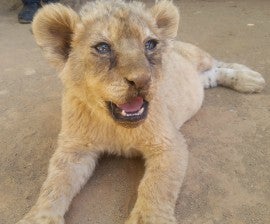-

The quota increase may even incentivize the creation of new breeding facilities. Audrey Delsink/HSI
WASHINGTON—Yesterday, South Africa’s Department of Environmental Affairs announced the 2018 lion bone export quota. The approved quota of 1,500 skeletons is effective from June 7, 2018.
Humane Society International/Africa’s executive director, Audrey Delsink, issued the following statement:
“The lion bone trade is South Africa’s claim to shame. Last year’s quota of 800 was shocking enough: the increase to 1,500 in 2018 has no scientific basis and is a blatant license to kill for the lion breeding industry. An expanded export quota for captive lion skeletons normalizes and exacerbates demand for parts of lions and even other big cats, such as tigers, as research and seizures have shown.
Give now to help protect lions and other animals worldwide.
“It is unconscionable that thousands of lions kept in captivity will soon meet their fate in slaughterhouses across South Africa. The quota increase may even incentivize the creation of new breeding facilities; a travesty when the current facilities are fraught with deplorable animal welfare and provincial irregularities as demonstrated recently in the Orange Free State Wag n Bietjie case. Humane Society International calls on South Africa and the importing countries—Laos and Viet Nam—to take the high road and end their role in this gruesome trade.”
Background:
- The African lion is listed in Appendix II in the Convention on International Trade in Endangered Species of Wild Fauna and Flora (CITES) with a zero export quota for wild specimens for commercial purposes. However, an annotation to the listing allows South Africa to establish annual export quotas for trade in lion parts for commercial purposes, derived from captive breeding operations.
- According to a report submitted to the 30th meeting of the CITES Animals Committee in July 2018, Viet Nam was the largest importer of lion bodies and the second largest importer of skeletons. Laos was the largest importer of lion bones and skeletons. The U.S. was the largest import of lion trophies. The report suggested that some lion poaching and trafficking involves organized criminal groups, and seizures alongside other commodities such as rhino horn indicate that these groups are dealing in multiple species.
- There are between 6,000 to 8,000 captive lions in more than 260 facilities across South Africa.
Media Contact: Rodi Rosensweig, 203-270-8929, RRosensweig@humanesociety.org
